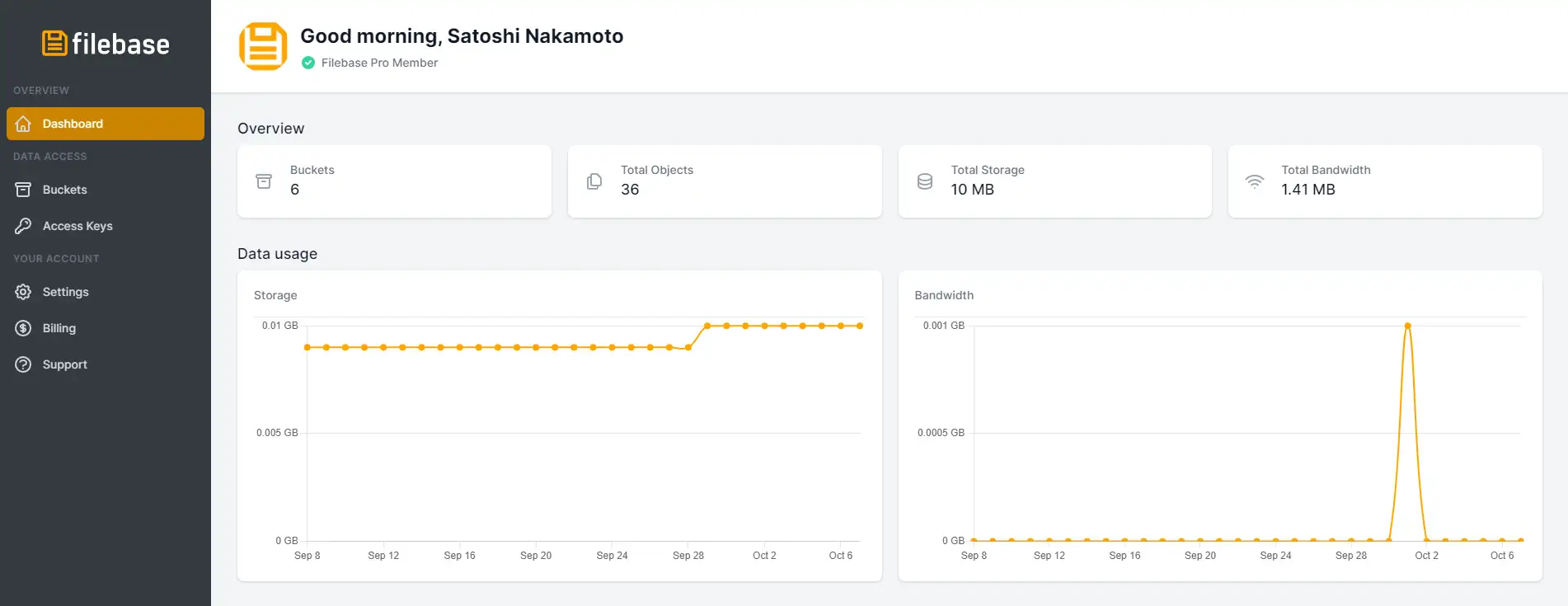About Filebase
Filebase is a leading platform that bridges the gap between traditional cloud storage and the decentralized future of the web. Founded on the principles of providing accessible, decentralized storage, Filebase utilizes the InterPlanetary File System (IPFS) and other decentralized storage networks to offer a reliable and user-friendly cloud storage solution. The platform is designed to cater to both individuals and enterprises who are looking to leverage the benefits of decentralized technology without compromising on the usability offered by conventional cloud storage providers.
At its core, Filebase is about democratizing access to decentralized storage by removing the technical barriers that typically come with using IPFS. By offering an S3-compatible API, Filebase allows developers to integrate decentralized storage into their existing workflows with minimal friction, making it easier for organizations to transition to a more decentralized web. Additionally, Filebase provides features like geo-redundancy and a straightforward interface that mimics traditional cloud storage services, making it accessible even to non-technical users.
Filebase was developed in response to the growing demand for decentralized storage solutions that can rival traditional cloud services in terms of ease of use and reliability. The platform was launched to address the complexities associated with decentralized storage technologies like IPFS and to make these technologies accessible to a wider audience. One of the critical milestones in Filebase’s development was the integration of S3-compatible API functionality, which allowed developers who are familiar with Amazon S3 to easily transition to using Filebase without the need for extensive retraining or changes to their existing workflows.
A significant focus of Filebase has been on ensuring data redundancy and availability. The platform achieves this through its geo-redundancy feature, where data is replicated across multiple storage nodes located in different geographic regions. This not only ensures that data is always accessible but also protects against data loss or downtime due to network issues in a particular location. Additionally, Filebase has introduced a public IPFS gateway, allowing for quicker and more efficient data retrieval. This gateway provides users with the flexibility to access their data seamlessly, regardless of where it is stored on the IPFS network.
Another notable aspect of Filebase’s development has been its emphasis on providing a user-friendly experience. While decentralized storage offers numerous benefits, it has traditionally been seen as difficult to use, particularly for those without a technical background. Filebase has tackled this challenge by designing an interface that closely mirrors those of traditional cloud storage providers, thereby lowering the barrier to entry for users who may be new to decentralized technologies. This focus on user experience is reflected in the platform's ongoing efforts to improve accessibility, including the introduction of various guides and tutorials aimed at helping users get the most out of the service.
In terms of competition, Filebase is often compared to other decentralized storage solutions such as Storj, Sia, and Arweave. Each of these platforms offers unique features and has its own approach to decentralized storage, but Filebase sets itself apart through its commitment to usability and its seamless integration with existing cloud storage technologies. This approach has allowed Filebase to carve out a niche in the market, attracting users who are interested in decentralized storage but are hesitant to abandon the familiarity and convenience of traditional cloud services.
Overall, Filebase’s journey has been marked by its dedication to simplifying decentralized storage and making it a viable option for a broader range of users. As the demand for decentralized solutions continues to grow, Filebase is well-positioned to be a key player in this evolving landscape, offering a blend of innovation, reliability, and user-centric design.
Filebase offers a comprehensive set of benefits and features that make it a standout option in the decentralized storage market:
- Decentralized Storage Network: Filebase leverages decentralized storage networks like IPFS, ensuring data is distributed across multiple nodes. This decentralization enhances data resilience and security by eliminating single points of failure common in traditional cloud storage systems.
- Geo-Redundancy: To enhance data availability and reliability, Filebase automatically replicates data across various geographic locations. This feature ensures that even if one node fails, your data remains accessible from other locations, providing robust protection against data loss.
- S3-Compatible API: Filebase supports an S3-compatible API, which means developers can use familiar tools and workflows associated with Amazon S3. This compatibility makes it easy to integrate Filebase into existing systems without needing to learn new protocols or rewrite codebases.
- User-Friendly Interface: Despite the complexity of decentralized storage, Filebase provides a straightforward and intuitive interface that mimics traditional cloud storage solutions. This design allows users to manage their data without needing deep technical knowledge, making it accessible to a broader audience.
- Public and Private IPFS Gateways: Filebase offers both public and private IPFS gateways, providing flexible options for data retrieval. These gateways ensure that users can access their data efficiently and securely, whether they need public or restricted access.
- Cost-Effective Pricing: By using decentralized storage networks, Filebase can offer competitive pricing compared to traditional cloud storage providers. This makes it an attractive option for users looking to reduce their storage costs without sacrificing quality or reliability.
- Interoperability with Traditional Cloud Services: Filebase is designed to be interoperable with traditional cloud services, allowing users to transition to decentralized storage without needing to overhaul their existing infrastructure. This feature is particularly beneficial for enterprises looking to gradually adopt decentralized technologies.
- Security and Privacy: Filebase ensures data security through encryption and decentralized storage, making it harder for unauthorized parties to access or manipulate data. The platform’s commitment to privacy aligns with the growing demand for more secure data storage solutions.
These features collectively make Filebase a versatile and powerful solution for users seeking the benefits of decentralized storage without the usual complexities associated with it.
To get started with Filebase and begin leveraging decentralized storage, follow these steps:
- Sign Up for an Account: Visit the Filebase website and sign up for a free account. The registration process is straightforward, and you will receive 5GB of free storage to start with.
- Familiarize Yourself with the Platform: Explore the Filebase dashboard and become familiar with the user interface. The dashboard is designed to be intuitive, making it easy to manage your storage buckets and access the platform’s features.
- Set Up a Storage Bucket: Create your first storage bucket through the dashboard. This bucket will act as the container for your data. Filebase’s interface guides you through the process, making it simple even for users new to cloud storage.
- Integrate with Existing Tools: If you are a developer or business user, take advantage of the S3-compatible API to integrate Filebase with your existing tools and workflows. Detailed documentation is available to help you set up this integration smoothly.
- Upload and Manage Data: Begin uploading your data to the Filebase storage buckets. You can upload files directly through the web interface or use tools that interact with the S3 API.
- Access Data via IPFS Gateways: Utilize the public or private IPFS gateways provided by Filebase to access and retrieve your data. These gateways ensure fast and secure data retrieval, whether you are accessing public content or private, encrypted files.
- Explore Additional Features: Filebase offers a range of additional features, such as data redundancy options and encryption. Explore these features to enhance your data storage strategy and ensure your data is secure and always accessible.
- Consult Documentation and Support: If you encounter any issues or need further guidance, the Filebase documentation provides comprehensive guides and troubleshooting tips. Additionally, Filebase offers customer support to assist with any specific questions or challenges.
By following these steps, you can effectively start using Filebase for your decentralized storage needs, benefiting from its combination of ease of use, reliability, and advanced storage capabilities.
Filebase Reviews by Real Users
Filebase FAQ
Filebase utilizes geo-redundancy, meaning your data is replicated across multiple locations worldwide. This redundancy ensures that even if one storage node fails, your data remains intact and accessible from other nodes, offering a robust layer of protection against data loss.
Yes, Filebase supports an S3-compatible API, allowing you to integrate it seamlessly with your existing cloud storage tools and workflows. This means you can transition to decentralized storage without needing to learn new software or make significant changes to your current setup.
Filebase offers a user-friendly interface that mimics traditional cloud storage platforms. It abstracts the complexities of decentralized technologies like IPFS, so you don’t need to have technical knowledge to store and manage your data effectively.
By leveraging decentralized storage networks, Filebase can offer competitive pricing models that are often lower than traditional cloud storage providers. This cost efficiency is achieved without compromising on data security or accessibility.
Yes, Filebase provides both public and private IPFS gateways, allowing you to control data access. You can choose to make your data publicly available or keep it restricted and secure using private gateways, depending on your needs.
You Might Also Like












